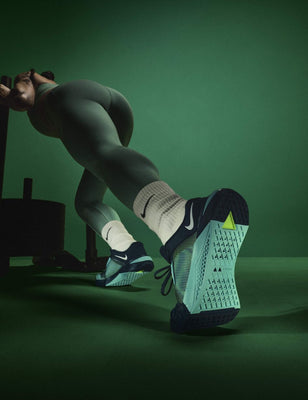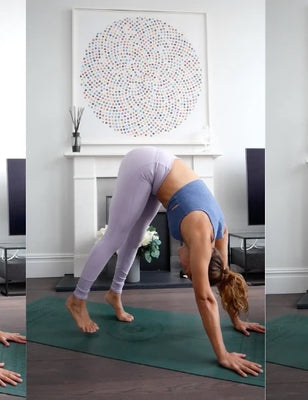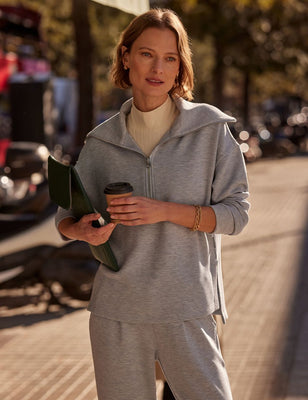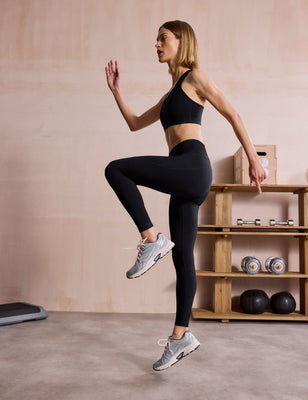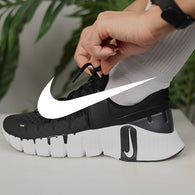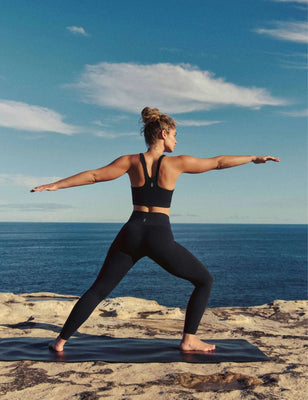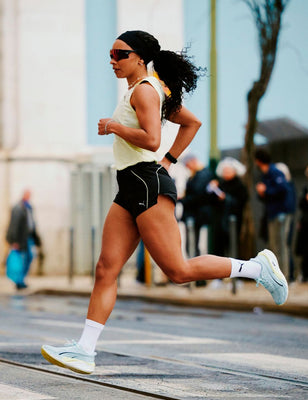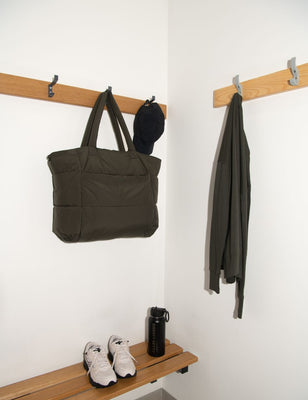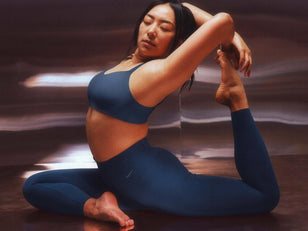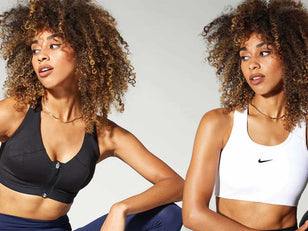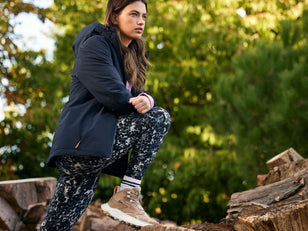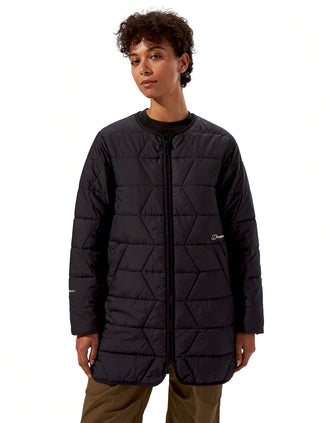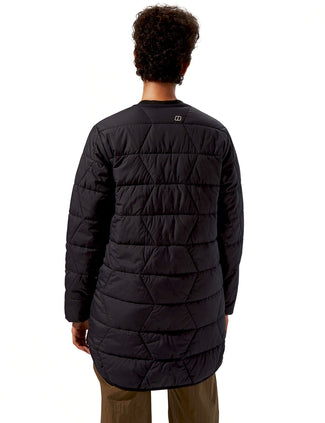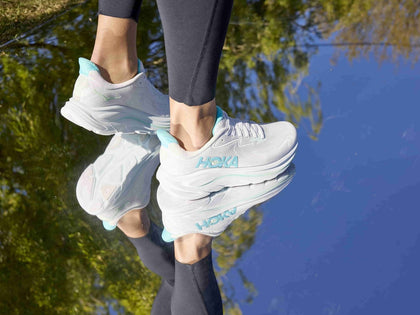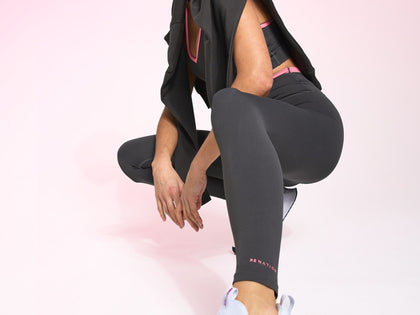You know the drill. Some days, exercising feels like a total walk in the park. Other days, it feels like you’re trying to climb up a hefty mountain, barefoot with the mother of all storms blowing in your face. The truth of the matter is that your body changes over the course of your menstrual cycle — and you might want to adapt your training regime to suit it.

To get the inside scoop, we spoke to Danielle Clement, M.Ed, MSN, WHNP, AGNP, a women’s and adult health nurse practitioner and reproductive and sexual health expert with a background in clinical research and education. She works across the product and content teams over at Clue app as their resident health expert for products and also as a science writer. Here’s what you need to know about how your cycle affects exercise.
How your menstrual cycle affects you
Chances are, as a woman, you know a thing or two about your cycle. You might already track it using an app or journal. You may know when you’re likely to experience bouts of low energy and when you get that all-important burst of motivation. As Clement explains, delving deeper into how each part of your cycle affects you is a smart health move.
“The menstrual cycle is an indicator of your body’s functions because in order to have a period, many parts of your body have to work together including your brain, pituitary gland, ovaries and the uterus,” she explains. “Having a cycle based on your own hormones can provide you with important feedback about your body and can be affected by your diet, activity level, health conditions and stress, among other things.”
So, your body changes naturally at different points in your cycle. Surely, you can harness that knowledge to supercharge your workout, right? Well, yes but it’s still early days here.

“When it comes to the link between cycles and exercise, science is just beginning to explore how fluctuations of hormones across the menstrual cycle can lead to different outcomes in training, performance, and muscle recovery,” says Clement.
The different phases of your cycle
There’s more to your cycle than you might expect. “The menstrual cycle is more than just a period,” explains Clement. Yes, where you are in your cycle can affect all parts of your body. “It’s a chain of activities in the brain, ovaries, and uterus linked to hormones — the chemical signals sent through the blood from one part of the body to another.”
Much like the moon, your menstrual cycle has different phases. Before we take a look at the available studies on how each of these phases affect you, you need to know what they are. You can break down the 28-day (ish!) period into a couple of phases.
“The menstrual cycle has two broad phases: the follicular stage (when your period starts until ovulation), and the luteal phase (ovulation until your next period starts),” says Clement. “The hormones guiding the ovarian cycle influence the changes that occur in the uterus such as your period blood and flow.” You can learn more about your cycle here.

How your menstrual cycle impacts exercise
Before we go any further, it’s important to note that nothing is conclusive. Scientists are just starting to make headway on how our hormones impact our energy levels and exercise. As Clement puts it: “There is conflicting and limited research on how hormones impact fitness and strength during the different phases of your menstrual cycle.”
Plus, each of us has a different experience. “Everyone is unique, and your body is not a clock. The menstrual cycle is variable, meaning it does not always come at the predicted time. Even in people with fairly predictable periods, ovulation doesn't happen on the exact same day for every cycle. There isn’t really a ‘typical’ menstrual cycle.”
Despite these facts, it’s worth taking a look at the available research to see whether it can help you enhance your training. With that in mind, let’s take a look at some of the findings:
-
Yes, your energy may dip when you’re on your period
At the start of your period and up until you start ovulating, you may notice lower energy levels. Your body is under an immense amount of strain and you will naturally want to rest. It’s not all in your head — it’s likely that you are feeling the effects of the follicular phase.
“A recent analysis of the existing research found that exercise performance, such as strength, speed, and agility, may be slightly reduced in the follicular phase, compared with performance in the luteal phase — from ovulation until your next period),” says Clement. “While slight changes in performance could be meaningful for elite or competitive athletes, these changes are typically not noticed by the general population.”
“Changes in hormones can also impact your muscle recovery after a big workout,” she continues. “Researchers have found that when oestrogen and progesterone =are at their lowest levels during the early part of your follicular phase, muscles may be more vulnerable to injury or strain and may require more post workout recovery time.”

“In plain English, if you are in the phase of life where you ovulate and have periods, you might notice lower performance and have a slower recovery in the very early part of your cycle, from when your period starts to ovulation,” says Clement.
“There may be a slight increase in your ability to push harder and recover more quickly in the second half of your cycle, from ovulation to when your period starts. However, everybody is different and you could notice other unique patterns if you track your period.”
-
You might want to take that time to rest and recover
Since your energy may be flagging when you’re on your period, it may be the perfect time to take a break. Giving yourself some time for that all-important R&R helps you to perform well. Rather than completely skipping the gym, you may want to simply take things easier.
“Rest days are essential in any training program, and may be best taken during the early follicular phase (day one through days 4-7 of your period) when oestrogen and progesterone are at their lowest,” advises Clement. “That doesn't mean you should skip training in this phase. You might want to consider lighter loads and more recovery time.”
-
Try some strength training when you’re ovulating
When your period is over and you start ovulating, you might notice a newfound burst of energy. You can thank your hormones for that one. If that’s the case, it’s worth capitalising on the change and dabbling in some strength training or even the odd HIIT class instead.

“Some people may notice an increase in their energy and enhanced performance during the second half of their cycle starting at ovulation when sex hormones — oestrogen and progesterone — are at their highest levels,” says Clement. “During ovulation the ovaries produce more testosterone that can influence muscle building and strength.”
-
Your performance may peak after ovulation
Looking to hit some fitness goals? When you’ve finished ovulating, it may be the perfect time to beat your PB. The sudden shift in hormones may mean that you’re ready to increase your performance and get more out of your day-to-day workout regime.
“After ovulation, progesterone levels drop and oestrogen levels remain elevated which could be beneficial to performance outcomes,” says Clement. “It is important to do what feels best for your body throughout all phases of your menstrual cycle.” You can also make an individual plan based on your own cycle. “It is possible to track your own personal baseline and see patterns over time so that you can adapt your training plan if needed.”

The Takeaway
It’s no surprise that hormones impact our energy levels and training routine. However, the jury’s still out on the finer details. According to the evidence we do have — which we’ve listed above — it may be worth resting and training at different points during your cycle.
If you’re hoping to give it a go, you can start tracking your individual cycle on the Clue app and noting down any changes in energy, performance, and strength. The more you learn about your own body, the better position you will be in to create a training routine to suit it.
“It is important to discuss menstrual cycle changes and concerns with your healthcare provider,” says Clement. “There are some sports medicine providers that may be able to provide you with an individualised training plan that is safe for your body.”






